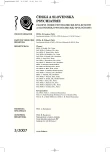Fronto-temporal Disconnection in Schizophrenia
Fronto-temporální dyskonekce u schizofrenie
Současná neuropsychologie značnou měrou přispívá k pochopení těch aspektů schizofrenního onemocnění, které přímo souvisí s kognicí. Jedním z vlivných neuropsychologických přístupů je takzvaná dyskonekční hypotéza, která předpokládá, že dysfunkční nejsou pouze jednotlivé oblasti mozku schizofrenních pacientů, ale hlavně komunikace mezi těmito oblastmi. Podkladem dyskonekce může být dysfunkce na anatomické, neurochemické nebo funkční úrovni. Tento článek se primárně zaměřuje na úroveň poslední a zužuje svou pozornost na dysfunkční komunikaci mezi frontálním a temporálním kortexem. Je zde nastíněn vývoj takzvané funkční frontotemporální dyskonekce a podrobněji popsány možné souvislosti této dyskonekce s rozličnými kognitivními poruchami a psychiatrickými fenomény. Zdá se, že by narušená komunikace mezi zmiňovanými oblastmi mohla být jednou z příčin poruch paměti, řeči nebo exekutivních funkcí u schizofrenie. Mohla by také vysvětlit princip vzniku některých sluchových halucinací. Jestli lze funkční fronto-temporální dyskonekci považovat také za trait marker schizofrenie je ještě třeba potvrdit.
Klíčová slova:
fronto-temporální dyskonekce, schizofrenie, kognice, frontální kortex, temporální kortex.
Authors:
M. Černík
Authors‘ workplace:
Psychiatrická klinika LF MU a FN Brno
přednostka prof. MUDr. E. Češková, CSc.
Published in:
Čes. a slov. Psychiat., 103, 2007, No. 3, pp. 124-130.
Category:
Comprehensive Reports
Overview
Contemporary neuropsychology contributes extensively to the understanding of those aspects of schizophrenia that are directly related to cognition. One of the most influential approaches to schizophrenia is the so-called ‘disconnection hypothesis’. This approach assumes that, in addition to disfunctions in separate brain regions, communication between them is disturbed. The cause of the disconnection may be in anatomical, neurochemical or functional disturbances. This article is aimed at functional disconnection and pays attention to dysfunctional communication between the frontal and temporal lobes. It also outlines the development of the so-called functional fronto-temporal disconnection and its hypothetical connection to various cognitive dysfunctions and psychiatric phenomena. The disturbed communication between frontal and temporal regions may cause memory, speech or executive dysfunctions. The fronto-temporal disconnection could also explain how some auditory hallucinations arise. It is not clear whether this disconnection could be one of the trait markers of schizophrenia.
Key-words:
fronto-temporal disconnection, schizophrenia, cognition, frontal cortex, temporal cortex.
Labels
Addictology Paediatric psychiatry PsychiatryArticle was published in
Czech and Slovak Psychiatry

2007 Issue 3
- Hope Awakens with Early Diagnosis of Parkinson's Disease Based on Skin Odor
- Memantine in Dementia Therapy – Current Findings and Possible Future Applications
- Memantine Eases Daily Life for Patients and Caregivers
- Deep stimulation of the globus pallidus improved clinical symptoms in a patient with refractory parkinsonism and genetic mutation
Most read in this issue
- Oculocutaneous Syndrome Associated with Prolonged Phenothiazines Therapy
- Parental Alienation Syndrome and Post Divorce Adaptation
- Fronto-temporal Disconnection in Schizophrenia
